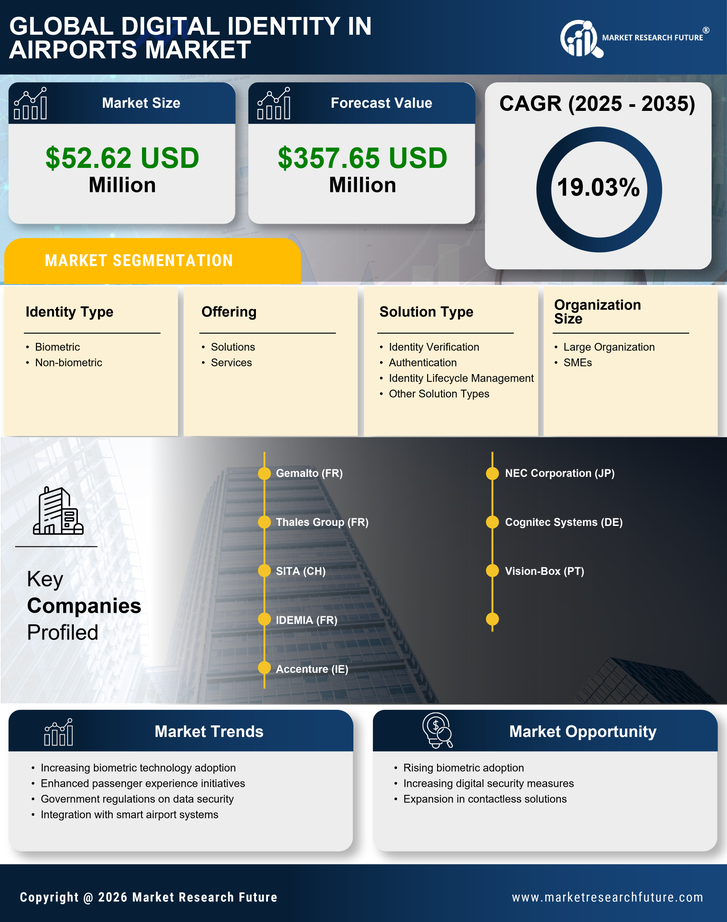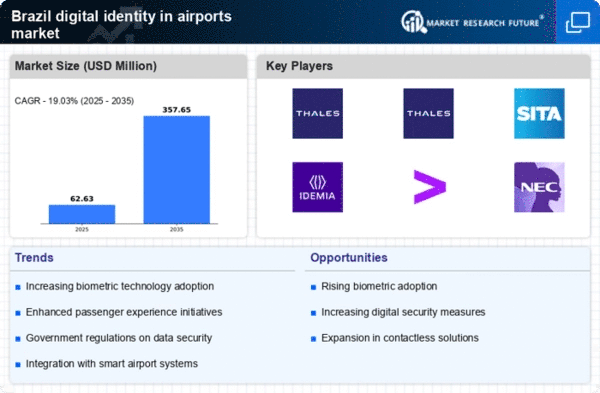Increasing Passenger Volume
The digital identity-in-airports market in Brazil is experiencing growth due to the rising number of air travelers. In recent years, passenger traffic has surged, with estimates indicating an increase of approximately 5% annually. This growth necessitates efficient identity verification processes to manage the influx of travelers. Airports are increasingly adopting digital identity solutions to streamline check-in, security, and boarding procedures. By implementing biometric technologies, airports can enhance the passenger experience while reducing wait times. The Brazilian government has also shown support for initiatives that promote technological advancements in the aviation sector, further driving the adoption of digital identity solutions. As the volume of air travel continues to rise, the demand for efficient identity management systems is likely to expand, positioning the digital identity-in-airports market for significant growth.
Rising Demand for Enhanced Security
In the context of increasing global security concerns, the digital identity-in-airports market is witnessing a heightened demand for enhanced security measures. Brazilian airports are under pressure to implement robust identity verification systems to ensure the safety of passengers and staff. The adoption of digital identity solutions, particularly those utilizing biometric technologies, is seen as a proactive approach to mitigating security risks. Recent studies suggest that airports employing advanced identity management systems can reduce the likelihood of security breaches significantly. This trend is further supported by public sentiment, as travelers increasingly prioritize safety when choosing airlines and airports. Consequently, the focus on security is likely to drive investments in the digital identity-in-airports market, as stakeholders seek to adopt cutting-edge solutions that address these concerns.
Government Initiatives and Regulations
Brazilian authorities are actively promoting the digital identity-in-airports market through various initiatives and regulations aimed at enhancing security and efficiency in air travel. The government has introduced policies that encourage the adoption of biometric identification systems, which are seen as essential for modernizing airport operations. For instance, the National Civil Aviation Agency (ANAC) has been working on frameworks that support the integration of digital identity solutions in airports. These regulations not only aim to improve security but also to facilitate smoother passenger flows. The potential for public-private partnerships in this sector is also noteworthy, as collaboration between government entities and technology providers could lead to innovative solutions. As these initiatives unfold, they are expected to significantly impact the growth trajectory of the digital identity-in-airports market.
Technological Advancements in Biometrics
The digital identity-in-airports market is being propelled by rapid advancements in biometric technologies. Innovations in facial recognition, fingerprint scanning, and iris recognition are becoming increasingly sophisticated, allowing for more accurate and efficient identity verification processes. In Brazil, the integration of these technologies into airport operations is gaining traction, with several major airports already implementing biometric systems. For example, biometric boarding solutions have been introduced, which can reduce boarding times by up to 30%. This not only enhances the passenger experience but also improves operational efficiency for airlines and airport authorities. As technology continues to evolve, the digital identity-in-airports market is likely to see further enhancements in security measures and user convenience, making it a critical component of modern air travel.
Consumer Preference for Seamless Travel Experiences
The digital identity-in-airports market is also influenced by changing consumer preferences, particularly the desire for seamless travel experiences. Brazilian travelers are increasingly seeking convenience and efficiency during their journeys, which has led to a growing acceptance of digital identity solutions. The integration of mobile applications with biometric verification processes allows passengers to navigate through airports with minimal friction. Recent surveys indicate that over 70% of travelers in Brazil express a preference for contactless and expedited check-in procedures. This shift in consumer behavior is prompting airports to invest in technologies that facilitate smoother transitions from check-in to boarding. As the demand for seamless travel experiences continues to rise, the digital identity-in-airports market is likely to expand, driven by innovations that cater to these evolving preferences.

















